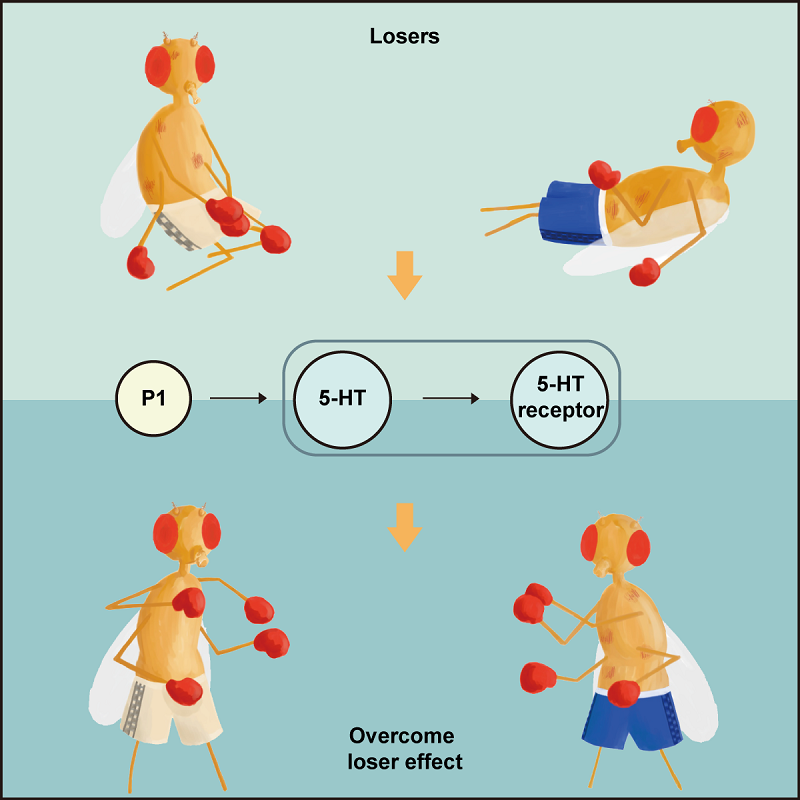Research Reveals Serotonin Signals' Role in Reversing "Loser Effect" Mechanism
Prof. ZHU Yan, Principal Investigator of the State Key Laboratory of Brain & Cognitive Sciences, the Institute of Biophysics of Chinese Academy of Sciences (CAS), published a research paper entitled "Serotonin Signals Overcome Loser Mentality in Drosophila" in iScience on October 23. The research found that serotonin (5-HT), serotonin receptors, and the neural circuits play an important role in reversing the loser effect.
Past social experiences can affect the mental state of humans and the functional state of animals' brains, causing individuals to behave differently in the same situation or facing the same stimulus.
The phenomenon that individuals, who have high morale and are defeated, run away and avoid subsequent fights is called the "loser effect", but the molecular neural basis of the "loser effect" and the way to reverse it is unknown.
Through a large-scale optogenetics-based behavioral screening, researchers found that activating 5-HT neurons could significantly increase aggression of Drosophila who was defeated in previous fighting and reduce the latency of attack.
In addition, by activating 5-HT neurons, around one-third of losers can reverse the fights and even defeat the previous winners. What's more interesting is in subsequent encounters of two losers, activating 5-HT neurons once again will lead to a new win-loss result. Activating serotonin neurons can also arouse aggression of losers with multiple failures.
Further research found that activating only a pair of 5-HT neurons can reverse the "loser effect" of Drosophila (or fruit flies). P1 neurons act upstream and 5-HT1B neurons in the ellipsoid body act downstream of 5-HT neurons to arouse losers.
Researchers are able to reconstruct aggressiveness of losing flies by up-regulating the activity of neurons. However, other neurons known to be involved in regulating their aggression, such as TK neurons and PLP neurons, are not involved in rebuilding aggression of the loser. Serotonin and its receptor 5-HT1B molecules are also important signaling molecules to reverse the "loser effect".
More importantly, researchers found that a single failure may lead to individual losers' behavioral defects or abnormalities in domain, intimidation and courtship. These abnormal behaviors can be rescued by regulating the serotonin pathway.
As the "loser effect" and the serotonin pathway are common in the animal kingdom, the study is expected to help understand psychological problems caused by stressful experiences, as well as provide a new perspective and experimental evidence of the mechanisms of post-traumatic stress disorder (PTSD) caused by disasters and wars.
Research fellow ZHU Yan is the corresponding author of the article and postdoctoral fellow HU Shaowei is the first author. Associate research fellow SUN Yuanjie and Ph.D YANG Yantong have made important contributions to the subject.
The research was financed by the National Natural Science Foundation of China, the Beijing advanced project program, the CAS key research program of frontier science, and the CAS interdisciplinary innovation team.

The P1--5-HT--5-HT1B pathway regulating the "loser effect" of Drosophila
(Image by Dr. ZHU Yan's group)
Article link:http://www.ibp.cas.cn/kyjz/zxdt/202010/t20201023_5721339.html
Contact: ZHU Yan
Institute of Biophysics, Chinese Academy of Sciences
Beijing 100101, China
Email: zhuyan@ibp.ac.cn
(Reported by Dr. ZHU Yan's group)

